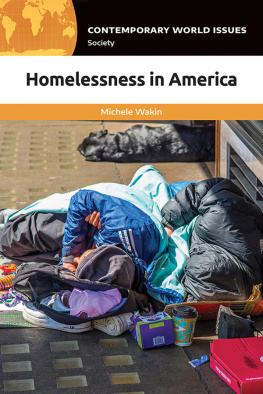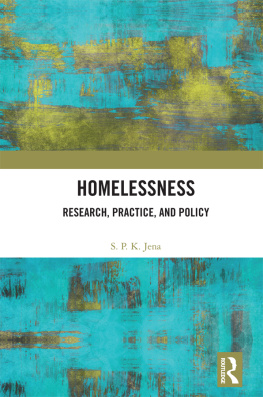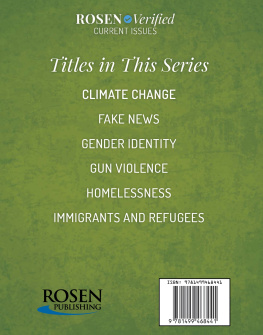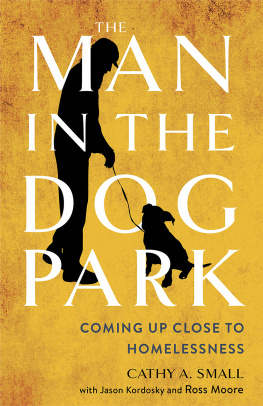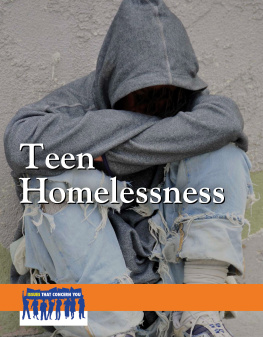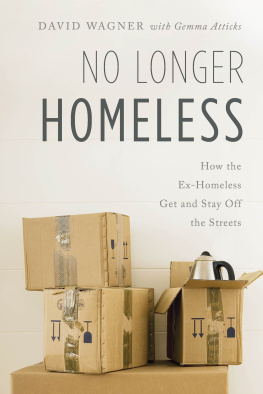Homelessness in America
Recent Titles in the
CONTEMPORARY WORLD ISSUES
Series
The Climate Change Debate: A Reference Handbook
David E. Newton
Voting Rights in America: A Reference Handbook
Richard A. Glenn and Kyle L. Kreider
Modern Slavery: A Reference Handbook
Christina G. Villegas
Race and Sports: A Reference Handbook
Rachel Laws Myers
World Oceans: A Reference Handbook
David E. Newton
First Amendment Freedoms: A Reference Handbook
Michael C. LeMay
Medicare and Medicaid: A Reference Handbook
Greg M. Shaw
Organic Food and Farming: A Reference Handbook
Shauna M. McIntyre
Civil Rights and Civil Liberties in America: A Reference Handbook
Michael C. LeMay
GMO Food: A Reference Handbook, Second Edition
David E. Newton
Pregnancy and Birth: A Reference Handbook
Keisha L. Goode and Barbara Katz Rothman
Hate Groups: A Reference Handbook
David E. Newton
Plastics and Microplastics: A Reference Handbook
David E. Newton
Prescription Drugs: A Reference Handbook
David E. Newton
The U.S.-Mexico Border: A Reference Handbook
Michael C. LeMay
Books in the Contemporary World Issues series address vital issues in todays society such as genetic engineering, pollution, and biodiversity. Written by professional writers, scholars, and nonacademic experts, these books are authoritative, clearly written, up-to-date, and objective. They provide a good starting point for research by high school and college students, scholars, and general readers as well as by legislators, businesspeople, activists, and others.
Each book, carefully organized and easy to use, contains an overview of the subject, a detailed chronology, biographical sketches, facts and data and/or documents and other primary source material, a forum of authoritative perspective essays, annotated lists of print and nonprint resources, and an index.
Readers of books in the Contemporary World Issues series will find the information they need in order to have a better understanding of the social, political, environmental, and economic issues facing the world today.
Contemporary World Issues
Homelessness in America
A Reference Handbook
Michele Wakin

Copyright 2022 by ABC-CLIO, LLC
All rights reserved. No part of this publication may be reproduced, stored in a retrieval system, or transmitted, in any form or by any means, electronic, mechanical, photocopying, recording, or otherwise, except for the inclusion of brief quotations in a review, without prior permission in writing from the publisher.
Library of Congress Cataloging-in-Publication Data
Names: Wakin, Michele, author.
Title: Homelessness in America: a reference handbook / Michele Wakin.
Description: Santa Barbara, California: ABC-CLIO, [2022] |
Series: Contemporary world issues | Includes bibliographical references and index.
Identifiers: LCCN 2021040475 (print) | LCCN 2021040476 (ebook) | ISBN 9781440874857 (hardcover ; alk. paper) | ISBN 9781440874864 (ebook)
Subjects: LCSH: HomelessnessUnited StatesHistory.
Classification: LCC HV4504 .W3244 2022 (print) | LCC HV4504 (ebook) | DDC 362.8/920973dc23
LC record available at https://lccn.loc.gov/2021040475
LC ebook record available at https://lccn.loc.gov/2021040476
ISBN: 978-1-4408-7485-7 (print)
978-1-4408-7486-4 (ebook)
26 25 24 23 221 2 3 4 5
This book is also available as an eBook.
ABC-CLIO
An Imprint of ABC-CLIO, LLC
ABC-CLIO, LLC
147 Castilian Drive
Santa Barbara, California 93117
www.abc-clio.com
This book is printed on acid-free paper 
Manufactured in the United States of America
Mom and DadThis one is for you!
Bridgewater Scholars: Sefora Alcindor, Nelly Enongenepie Mbulle, Lorenz Marcellus, Rubie Marcellus, Anne Maxime, Nayara Semedo, Cincere Tarkpor, and Zachary Wright.
Thank you for being a source of grace and inspiration.
Contents
Anne R. Roschelle
Sefora Alcindor
Ronald Hallett
Katy Abel
Colby King
Maria Foscarinis
April Connolly
Sam Tsemberis
Homelessness in the United States is surprising because it is a country of great wealth. It is also surprising because the United States is viewed as a land of opportunity. When people are homeless, we dont often question how our society and economy have failed them. Instead, we wonder what is wrong with homeless people themselves. The American Dream is based on the idea that anyone can become rich and successful with enough hard work and dedication. Perhaps this leads us to think that homeless people are not working hard enough or that they are not dedicated enough. Systemic racism and cyclical poverty show us that this is not the case. Ongoing structural barriers prevent equal access to housing, education, and employment, excluding people from these basic resources and then blaming them for their own poverty and homelessness.
This book examines individual and societal risk factors that make people vulnerable to homelessness and poverty. It documents the nations effort to understand and serve a growing, diverse population. It also shows that throughout the nations history, access to housing is structured by race as a social category. This means that unequal access to housing has left people of color, and African Americans in particular, overrepresented in marginal, urban spaces and within the homeless population. As sociologists and race theorists point out, urban neighborhoods bereft of opportunity also become targets for law enforcement. This targeting is another shocking feature of U.S. society, world leader in class and race-based policing and incarceration.
In addition to housing, exploring access to education and employment shows that these resources are also identity based. Women and people of color have always been paid less in the U.S. labor market, excluded from training and educational opportunities, and shut out of certain professions entirely. Research shows that discrimination is not based on performance or ability but on stereotypical ideas of capability. Over time, being unable to accumulate wealth affects generations, not merely individuals. This means that it takes at least twice as long to purchase a home and to afford an education or quality health care, depending on who you are. Single mothers, for example, must work four times as hard at low-wage jobs to afford basic needs goods for their children. When they seek welfare assistance, they face strict eligibility rules, racism, time limits, and a punitive approach to poverty. Increasingly, welfare assistance and emergency services offer only temporary relief from homelessness and a life trapped in underfunded schools, low-wage employment, and substandard housing.
The effects of experiencing homelessness are traumatic for both adults and children. Children who experience chronic homelessness often face instability later in life. Even mere housing insecurity can have detrimental effects. The toll that homelessness takes on children affects their personal, social, and academic development, putting them further behind their housed peers. In addition, unaccompanied homeless youth are a growing portion of those experiencing homelessness. Factors that lead to youth homelessness include LGBTQ status, criminal justice involvement, foster care, physical and sexual abuse, and mental health and substance use issues. All of these are risk factors that can precipitate homelessness, lead to trauma, and make exit more difficult.

